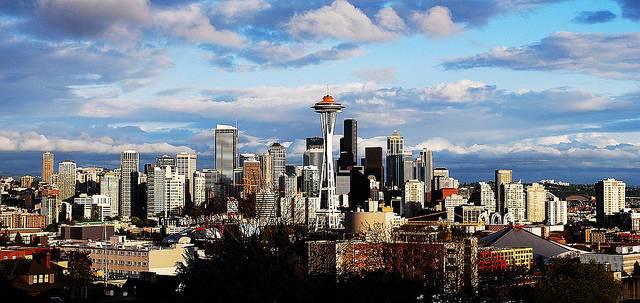
The buzz over Amazon’s announcement of its search for a second headquarters that will eventually equal the size of the company’s Seattle hub has sent cities across North America into a frenzy. And according to David McCabe of Axios, the recent trends of cities cutting deals for companies such as General Electric and Boeing could result in Amazon scoring over $10 billion in reduced tax breaks and other incentives.
Expect the bidding to be fierce, as CNN has already released a list of what the network says are the top eight cities that are the best match for Amazon’s second home. Cities such as San Jose, Dallas and Tulsa are amongst the metro areas salivating at the chance to land 50,000 jobs that on average will pay $100,000 annually plus benefits. Several Midwestern cities, noting the high price of living in Seattle and Silicon Valley, believe more reasonable costs in America’s heartland along with proximity to much of the country’s population together make one of its leading cities a fit for what the company has dubbed “HQ2.”
The numbers alone will tempt cities to offer all kinds of sweetheart deals, whether they include free or cheap land, relocation grants, reduced permitting fees, utility incentives and fee reductions. After all, Amazon has claimed that from 2010 to 2016, its investments in the Seattle region have contributed another $38 billion to the area’s economy – or $1.40 for each $1 the company has invested. The vetting has most likely begun, as the company is ready to review proposals and has made it clear what exactly it seeks in this new headquarters.
The possibility of adding Amazon to a local roster of corporate headquarters is also exciting as Amazon’s completion of its Whole Foods acquisition, along with the lower prices for many products, has boosted foot traffic to those stores by an average of 25 percent. While a spike in curious customers does not necessarily translate into an immediate surge in sales, Amazon is inching closer to mastering one market that has so far eluded it: groceries. Based on the success of Amazon’s online sales of Whole Foods’ private-label 365 products, civic leaders will easily convince themselves that these jobs will not only flock to their cities, but will stay indefinitely.
The big question, however, is whether the massive deals cities have long been offering companies in order to land a marquee brand such as Amazon are worth the investment. Good Jobs First, a policy resource center that promotes corporate and government accountability in economic development, has tracked almost 400 “megadeals” worth at least $75 million – with the largest, of course, Washington State’s 2013 deal that granted Boeing $8.7 billion to keep much of its manufacturing in the Seattle region.
According to Good Jobs First’s researchers, the largest problem with these deals by far has been transparency. “The single most opaque area of economic development spending is corporate income tax credits,” the report’s authors concluded. The cost of sales and property tax exemptions were also difficult to add up, suggesting the financial numbers announced in a city’s and company’s press releases of new headquarters or factories are in the long run usually underestimated.
Some city leaders have already begun to question the wisdom of coughing up billions in incentives when many of these cities already offer what Amazon says is key, including good airport connections, convenient transit, access to talent and quality of life. And despite recent hiccups, Amazon is reaping profits - $14.5 billion last quarter. Kim Walesh, San Jose’s economic development director, wrote in an email to the San Jose Mercury News, “We believe that San Jose is an ideal city for Amazon’s consideration, as we attract world-class tech talent, we have diverse real estate sites available, and an excellent transit infrastructure. And of course, we’ve got the weather.”
Ro Khanna, a U.S. Representative who represents much of the San Jose area, was quite blunt in his assessment of big financial aid packages completed over the years to attract the likes of Amazon. “The challenge is that it shouldn't be done as a race to the bottom where you have massive tax breaks coming at the expense of public schools or public infrastructure when the top corporations already have record profits,” he told Axios.
Cities and states should be concerned about the degree to which they dangle tax credits and other perks when landing companies. Although Wisconsin is basking in its deal landing a $10 billion Foxconn flat panel screen factory, critics of the deal have pointed out that Foxconn has promised similarly sized projects worldwide, only to back out of them at times. Up north in Seattle, the decrease in orders for Boeing’s 777 jetliners has nudged the aviation giant to layoff thousands of workers over the past year, leading some to wonder if the billions thrown at the company was a smart decision.
Image credit: Joe Wolf/Flickr

Leon Kaye has written for 3p since 2010 and become executive editor in 2018. His previous work includes writing for the Guardian as well as other online and print publications. In addition, he's worked in sales executive roles within technology and financial research companies, as well as for a public relations firm, for which he consulted with one of the globe’s leading sustainability initiatives. Currently living in Central California, he’s traveled to 70-plus countries and has lived and worked in South Korea, the United Arab Emirates and Uruguay.
Leon’s an alum of Fresno State, the University of Maryland, Baltimore County and the University of Southern California's Marshall Business School. He enjoys traveling abroad as well as exploring California’s Central Coast and the Sierra Nevadas.














